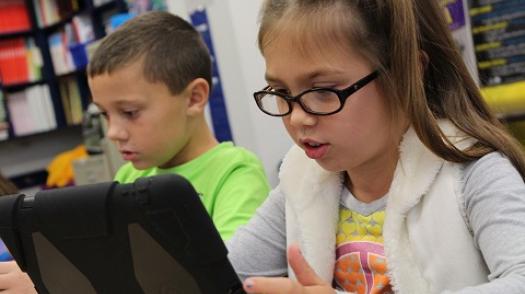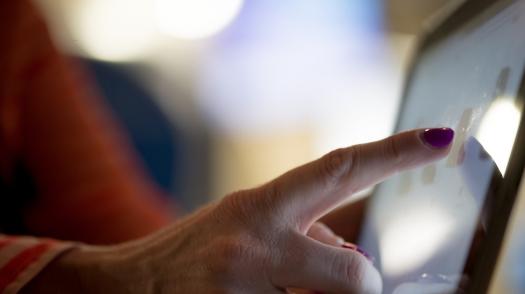
iPad and tablet learning during lockdown
With children at home during the coronavirus lockdown, Amy Wright, Advanced Practitioner in Assistive Technology at The Children's Trust, shares her tips for children following a brain injury.
Amy from The Children’s Trust tells us how apps can help and we share 16 apps that are especially helpful.

Gaming and entertainment apps are often the most popular but what else can apps be used for? Apps that are intuitive and easy to customise can make a difference to our lives in many ways.
Apps are particularly helpful for people with a brain injury, with apps on productivity, lifestyle and communication available. If there is a part of your life that you think technology could help with, ask your healthcare professional for their advice on apps.
Amy Wright, advanced practitioner – assistive technology, The Children’s Trust, says: “Being an occupational therapist I am always looking for new ways to make everyday activities easier. I like to try out productivity apps with clients to see if any can help with things such as remembering diary dates/school timetables.
“I’ve found that taking time to customise them to suit the person makes all the difference. The diary is only as good if the info is easy to read and entered in correctly in the first place. This can take time but it’s worth it.”
Amy explains how it is important to spend time customising and practicing using an app because, while it can be quick to download, this doesn’t automatically save time or make things easier, especially for those where learning new skills takes that little bit longer.
“Take advantage of free versions to see which app suits your style the best,” said Amy. “Find the right one for you and it can make aspects of your life, such as remembering diary dates, maintaining health and wellbeing, much much easier!
We’ve pulled together a list of 16 helpful apps. Please note apps included are based on reviews available online. Not all apps have been tried by staff at The Children’s Trust.
CanPlan promotes independence and builds confidence by helping people with cognitive challenges complete tasks successfully. Virtually any activity can be broken down into a sequence of easy-to-follow steps, illustrated by photos and reinforced with optional text and audio. Scheduling and reminder features ensure that each task gets done on time.
Price: Free
From: Apple App Store
My Medical is an app where users can generate medical profiles for the whole family, organise all family doctors and their contact information, compile medication and dosage information, set reminders for appointments, and share their medical ID form with healthcare professionals.
Price: £4.59
From: GooglePlay
This is a family organisation app that includes a shared calendar, shopping lists, to do lists and a family journal. It allows a person with brain injury to stay up-to-date and keep track of various family events and duties.
Price: Free
From: GooglePlay and Apple App Store
The Choiceworks app helps children learn to complete daily routines, understand and control their feelings, and think about taking turns. Created with the support of leading hospitals and child development specialists, it’s designed for caregivers to support a child’s independence, positive behaviour and emotional regulation at home, in the community and at school.
Price: £9.99
From: Apple App Store
Dexteria is a set of therapeutic hand exercises to improve fine motor skills and handwriting readiness in children and adults. Its engaging hand and finger activities use the multi-touch interface to help build strength, control and dexterity.
Price: £5.99
From: Apple App Store
Injini’s collection of learning games are for young children, especially toddlers and preschoolers with cognitive, language and fine motor delays. The games contain 10 feature games with 90 puzzles, over 100 illustrations, eight farm-themed mini-games and more. Through fun games, the child practises their fine motor and language skills.
Price: £28.99
From: Apple App Store
Search and instantly download thousands of popular books and magazine titles. iBooks works with VoiceOver, which will read the contents of the pages out loud.
Price: Free
From: Apple App Store
The MIND app (Make an Impact on Neurological Disorders) features art, music and dance activities to appeal to the visual, physical and auditory capacities of patients with neurological disorders such as stroke and brain injury. Users can observe well-known art masterpieces, watch dance and exercise videos and enjoy music from different countries, as well as creating their own content.
Price: Free
From: Apple App Store
This app facilitates recalling an answer over expanding intervals of time (one minute, two minutes, four minutes etc). It helps to cement information for those with memory issues, with this method of spaced-retrieval training.
Price: £4.99
From: GooglePlay and Apple App Store
This app has brain exercises targeting memory, attention, speed, flexibility and problem solving. Users can design their own personalised training, including ‘courses’ with brain-injury specific content. More advanced features are available through paid subscription.
Price: Free
From: GooglePlay
Qcard is a life management app to help people who need a better way to remember, manage and get things done. It was created by a man who was involved in a serious motor vehicle accident, which resulted in a brain injury that changed his life. His struggles and frustrations led him to develop Qcard as a tool for himself and it helps people living with brain injuries or anyone with memory impairments.
Price: Free for 30 days, with in app purchase of £1.49/month after that
From: GooglePlay and Apple App Store
Designed for people with aphasia, this app provides a vocabulary of pictures and videos that talk in a natural human voice. The app can be downloaded either with a female or male voice. SmallTalk Aphasia contains a starter set of icons to introduce users to the Lingraphica communication system.
Price: Free
From: Apple App Store
This app was designed to help nonverbal people with motor-planning issues to communicate. It has two large, colour-coordinated buttons for yes and no. Press either, and have a voice read your selection. The HD version also provides the ability to program custom buttons with custom text and pictures.
Price: £2.99
From: Apple App Store
This app is a fully integrated dictation and transcription system. Record, edit and upload a digital recording then have the file transcribed to text.
Price: Free 5 minute trial, then £1.55 per audio minute
From: GooglePlay and Apple App Store
Download QR Reader for free on smartphones, which scans QR codes, barcodes and words. This will enable you to scan ID cards from ‘If I Need Help’. These are personal ID cards, ideal for someone with a brain injury, who may become distressed or need help if they get lost. The iD cards can provide health and contact information, accessible when their QR code is scanned.
Price: Free
From: GooglePlay and Apple App Store
This is a word-finding app to help people with aphasia and children with special needs practice important naming and description skills. It allows users to add their own images. Designed by a speech-language pathologist for use in the home and clinic, this app features photos, real voices and full customisation with over 700 words included.
Price: £23.99
From: GooglePlay and Apple App Store
Read Amy’s advice on how children who have had a brain injury can get the most out of apps on an iPad/tablet at home.

With children at home during the coronavirus lockdown, Amy Wright, Advanced Practitioner in Assistive Technology at The Children's Trust, shares her tips for children following a brain injury.

Therapist Amy gives us some inspiring adaptive tech ideas that are great for birthdays and Christmas.

Government announce trials of pioneering technology to support pupils with special educational needs and disabilities.